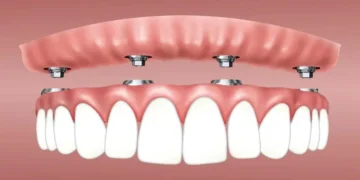Have you ever asked yourself, “Why are my teeth sensitive to cold?” There are a couple of possible answers to this question. To understand how to fix the problem, you will need to know what causes sensitive teeth in the first place.
Of course, if you are in need of treatment, you can always click here to get all the necessary information about the topic. Based on the situation, you might need to get root canal fillings, dental crowns, and so much more. But, the only way to know the answer is to visit your dentist.
Teeth Sensitivity
In the majority of cases, teeth sensitivity refers to sharp pain whenever you drink or eat something hot or cold, and noticing this type of reaction can be a sign of a deeper problem. That is why it is essential to visit a dentist as soon as you notice that your teeth react to a different temperature.
Of course, if it is an isolated situation that happened only once, there is a high chance it is not a problem. If you act on time and talk to your dentist, the problem will be fixed in no time. The sooner you act, the less damage it will be, and you will be able to continue with your activities without any problems.
Why Are Teeth Sensitive?
To understand why teeth get sensitive, we need to take a look at the structure of a tooth. The outer layer of the tooth is named enamel. It protects the inside of the tooth — more specifically, it protects the dentin.
Over time, the enamel will get worn out. Sugar and acidic foods can damage it, which means that dentin will get exposed. As a result, you will notice pain or discomfort when consuming various foods and drinks.
Additionally, having an exposed root of the tooth can also be a trigger for discomfort, and you will need to act as soon as possible if saving the tooth is your goal. But that explains the logic behind the pain only. If you are curious about why it happens, you should know that there are several reasons.
Gum Disease
Gum disease can lead to damaged or sensitive teeth. For example, receding gums can expose the root of the tooth, which will result in tooth sensitivity. In that case, the tooth might be healthy, but it will hurt if the root is exposed.
Over time, teeth might start falling out if untreated, which is one of many reasons to visit your dentist. Gum recession can lead to tooth loss and further problems with your oral health. The worst thing is that receding gums can worsen, and the only way to solve it is by using gum grafts and various complex procedures.
Cracked Tooth
Damaged or cracked teeth will leave dentin exposed, and it is one of the possible reasons why you might be experiencing discomfort. In the majority of cases, having a chipped tooth is something you will notice. In fact, it will feel as if the tooth is missing a huge part.
However, it is also possible that the damage is small enough for it to go under the radar. Of course, having regular checkups will eliminate the worry. Your dentist will be able to spot any type of irregularity with ease and fix the issue before it escalates.
Cavities
If any of these conditions worsen, it might lead to cavities. When the inner part of the tooth gets exposed to bacteria, cavities will start eating it from the inside. While it is painless at first, you will start noticing the difference pretty fast.
After a while, the tooth will become weak, it might break, and you might need a root canal treatment. It all comes to the extent of the damage. But it is one of many reasons why you might notice sensitivity while eating or drinking.
If the situation continues, it can lead to tooth loss and even damage to the jaw.
Is There a Treatment?
Yes, but your dentist needs to discover the source of the problem first. As soon as they have put their finger on it, they will be able to fix it. And there are numerous ways to approach each of these problems.
For cavities, the solution can vary from simple fillings to root canal therapy. If the tooth can’t be saved, extraction is the only way to go. Of course, that also means that you can get an implant instead or go for dentures, depending on the number of missing teeth.
Those that have gum disease would need to work on improving oral health, and gum grafting are one of many possible scenarios.
What to Avoid?
Prevention is one of the most important things when it comes to oral health. Instead of wondering how to solve a problem, you can work towards preventing it from happening in the first place.
That includes regular checkups, brushing your teeth regularly using appropriate products, flossing, and so much more. But even simple visits to the dentist can allow you to spot the problem before it turns into a huge issue.
You should also use a soft-bristled toothbrush, mouth guards (if needed), flossing, and everything else that your dentist will recommend.
When to Visit a Dentist?
As soon as you notice any change to your gum tissue, teeth, or anything else, you should talk to your dentist. It is as simple as that. Sensitivity can be an early sign of numerous problems, and it is in your best interest to address the issue as soon as you spot it.
Once again, regular visits to the dentist are highly recommended. You will hear whether there is something that needs to be done. In the best-case scenario, the dentist will tell you that everything is fine, and you won’t need to worry about anything until the next checkup.


 Home
Home









